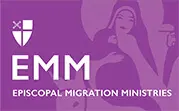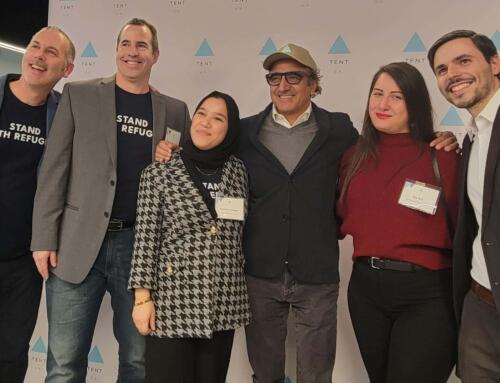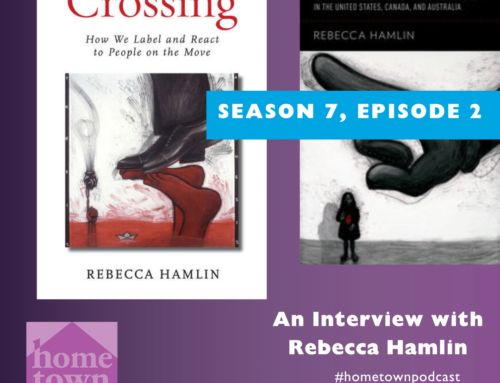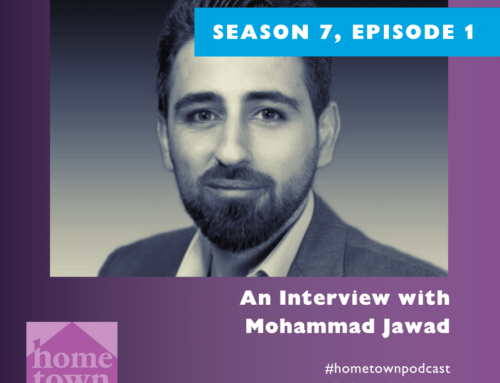The following is the story of The Rev. Leeann Culbreath, a priest in the Diocese of Georgia, and her friendship with Ben, an asylum seeker. This story serves to demonstrate the importance and power of accompanying those in detention.
* “Ben” is a pseudonym.
When I picked up the black plastic phone receiver in the jail visitation room to talk with my friend Ben for the first time in 2016, I couldn’t imagine how our friendship would unfold. He couldn’t either; I was his first visitor after 2.5 years in immigrant detention, an asylum seeker from Africa with only one contact in the United States.
Ben was the third person I had visited in immigrant detention. Another detained man told me about him and his ministry among the men in the facility. As a fellow pastor, I wanted to meet him to learn more about the spiritual needs and religious services inside.
Ben and I bonded quickly, and over the course of 2.5 years and countless more visits through plexiglass, we became chosen family. I (and others) accompanied him through detention and his release, and he accompanied me on a journey of hope as I learned to navigate the immigrant detention and legal system.
“The Lord is your strength,” he always reminded me, especially when the way was rocky and dark. Below is a snapshot of that accompaniment to date (though Ben has been released from detention, he still has to fight his asylum case in one of the toughest immigration courts in the country).
Visitation: Our friendship began with a one-hour visit through plexiglass. I visited Ben as often as possible, and others visited him as well. The visits encouraged him and helped us all learn about conditions in immigrant detention. When he was transferred briefly to another facility and could have contact visits, I invited our bishop diocesan to visit him and offer unction and a blessing. That meant a great deal to Ben.
Letters/phone calls: When we could not visit, we exchanged letters (he wrote far more than I did!) with updates and Scripture verses. In time, as he had funds in his account, he called me (I could not call him). He never failed to call me and send letters on holidays.
Prayer: We were prayer partners throughout the journey. I prayed for his ministry in detention, for his health, and for his case; he prayed for my ministry as it developed, for the non-profit that eventually formed (South Georgia Immigrant Support Network), and for my family. He continued to remind me at every turn, “The Lord is your strength.”
Direct Support: Friends and I offered financial support and books so he could make phone calls and to support his ministry. Our diocese provided $75/month for commissary support for 6+ months so he could purchase high-protein food items from the commissary, which were prescribed by a doctor for his health condition but the facility did not accommodate. We were not permitted to send care packages of any kind to persons in detention.
Legal support: Ben already had a pro bono attorney through Catholic Charities when I met him, helping him utilize all legal options available after his asylum case was initially denied. He filed a habeas corpus petition on his own to fight for release after prolonged and unnecessary confinement. Another friend sought and found a law firm willing to fight the habeas petition in court, pro bono. It took nearly a year for the hearing, and several months after the hearing for a ruling, and then another month or so for the government to appeal the ruling (which they did). Five attorneys from the firm were present at the hearing, and three of us from Ben’s support team also attended to demonstrate Ben’s strong community support. The judge referred to a letter of support from the bishop in the hearing, so we know our advocacy efforts made a difference.
The case was reviewed again by another judge, who upheld the original ruling, and Ben finally won humanitarian parole in February 2019. Throughout the process, members of Ben’s support team offered encouragement and wrote letters of support to the court.
Health care Advocacy: As mentioned above, Ben had ongoing health issues that remained untreated in detention. It took the facility over 2 years to finally respond to his requests to see a specialist for a known chronic condition. Left untreated, it could result in serious, debilitating health issues. The treatment was relatively simple—daily animal protein—but the facility did not provide it. I emailed ICE officials in the Atlanta Field Office and submitted a formal complaint to the U.S. Department of Homeland Security’s Office for Civil Rights and Civil Liberties (CRCL). Four months later, they responded saying that they “investigated” the claim and found no wrongdoing. His support team began reaching out to medical doctors in the area who might provide pro bono medical assessments, and we kept Ben’s legal team updated on health concerns. We garnered monthly commissary support so he could purchase some high-protein snacks to supplement his diet (but those were usually high-sodium, which impacted his blood pressure).
Post-release: Finally, in February 2019, Ben was released on humanitarian parole. Though he had a relative sponsoring him, the relative was unable to provide transportation or housing following release. Ben’s support team provided housing with a family, transportation, clothing/toiletries (he had nothing), cell phone, meals, and accompaniment to church services. We also assisted with renewing prescriptions and check-ups at a health clinic. I accompanied him to his ICE check-in in Atlanta several days after release and helped him reconnect with friends in the Atlanta area. We provided gift cards and helped him begin to develop a support system in Atlanta to see him through until he received work authorization. We have continued to assist with transportation to ICE check-ins (via Uber or volunteers) and with phone costs. In August 2019, he received work authorization, an essential step toward a stable future.
Throughout this journey with Ben, I have witnessed the cruelty of detention and the mind-boggling labyrinth of the immigration system. I have also experienced the power of hope and love to overcome obstacles and keep pressing forward. My faith and ministry have been transformed. I now see the essential role that people of faith can play in the individual lives of those oppressed by our broken immigration system, as well as in the collective work of justice for all of our immigrant neighbors. God has called and equipped the church to do both. Indeed, the Lord is our strength.
The Rev. Leeann Culbreath
Episcopal Diocese of Georgia
Founding Co-Chair, South Georgia Immigrant Support Network




